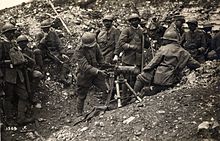Seventh Battle of the Isonzo
| Seventh Battle of the Isonzo | |||||||||
|---|---|---|---|---|---|---|---|---|---|
| Part of the Italian Front (First World War) |
|||||||||
 Italian troops with a captured Austrian machine gun |
|||||||||
|
|||||||||
| Belligerents | |||||||||
|
|
|
||||||||
| Commanders and leaders | |||||||||
|
Luigi Cadorna Emanuele Filiberto |
Franz Conrad von Hötzendorf, Svetozar Boroević | ||||||||
| Strength | |||||||||
| 240 battalions, 1,150 artillery pieces | 150 battalions, 770 artillery pieces | ||||||||
| Casualties and losses | |||||||||
| 17,000 | 15,000 | ||||||||
The Seventh Battle of the Isonzo was fought from September 14-17, 1916 between the armies of the Kingdom of Italy and those of Austria-Hungary.
A short, sharp encounter fought from 14-17 September 1916, the Seventh Battle of the Isonzo saw Italian Chief of Staff Luigi Cadorna shift his focus from broad-based diversionary attacks to tightly focused initiatives directed at single targets. This latest Isonzo battle saw the Italians try to extend their hold of their newly-won Gorizia bridgehead in attacks to the south-east of the town, in the area that is now part of the municipality of Miren-Kostanjevica on the Kras plateau.
However despite the greater concentration of resources upon a single point - as much intended to reduce the severely high casualty rate sustained to date - the Italians' success of the Sixth Battle of the Isonzo was not repeated, and the attack was called off after three days of heavy casualties, on 17 September 1916.
Nevertheless Cadorna's continued offensives along the Soča (Isonzo) did succeed in wearing away at Austro-Hungarian resources, both in terms of manpower and in crucial artillery availability. As each battle proceeded the Italians' war of attrition seemed ever more likely to wear the Austro-Hungarians into defeat, short of assistance from their German allies.
The Eighth Battle of the Isonzo followed on 10 October 1916.
Coordinates: 45°55′59″N 13°36′58″E / 45.9330°N 13.6160°E
...
Wikipedia
